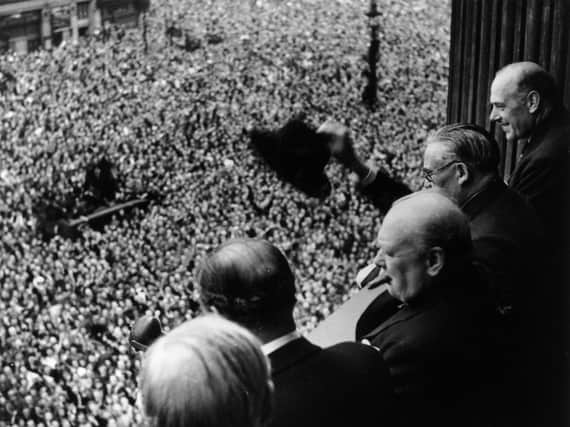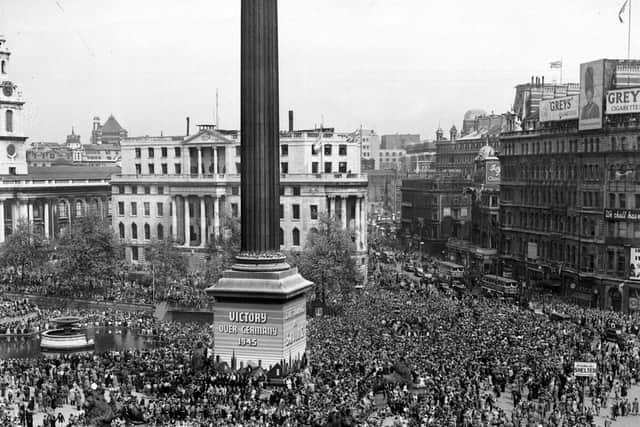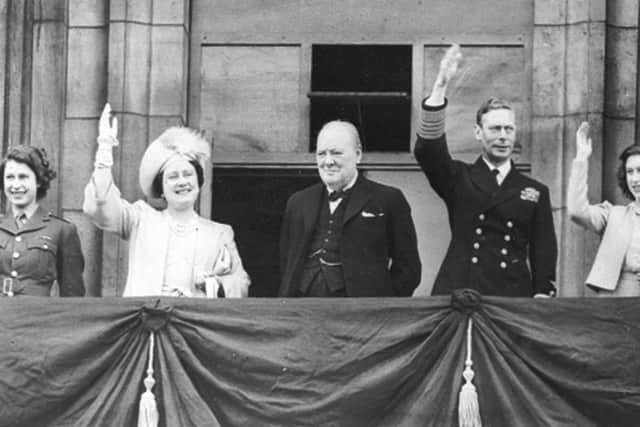VE Day - “This is your victory. It is the victory of the cause of freedom in every land."


It had been the news the nation had long been praying for but almost didn’t dare believe after nearly six long years of war.
Word quickly spread triggering euphoric scenes the length and breadth of the country with impromptu street parties and bonfires. Huge crowds gathered in towns and cities wreathed in celebration and relief. Flags and bunting were rolled out, church bells rang and friends and strangers hugged, danced and sang.
Advertisement
Hide AdAdvertisement
Hide AdA week after Hitler had taken his own life in an underground bunker in Berlin, the remnants of the regime under Grand Admiral Dönitz had surrendered, and the Third Reich was over.


Cheering crowds packed Trafalgar Square, Piccadilly and Pall Mall in London – a hoarding at the base of Nelson’s Column simply read: “Victory Over Germany 1945” – with people dancing spontaneously in the roads and frolicking in the fountains. Among the revellers were Princesses Margaret and Elizabeth, allowed to wander incognito amid the throng despite the protestations of the Queen.
Churchill addressed a massive crowd from the Ministry of Health building in Whitehall, saying: “This is your victory. It is the victory of the cause of freedom in every land. In all our long history we have never seen a greater day than this. Everyone, man or woman, has done their best.”
In the United States, President Truman gave a similar address from the Oval Office, as party-goers flooded Times Square. “This is a solemn but glorious hour,” he intoned. “The flags of freedom fly all over Europe.” And he paid tribute to his predecessor, Franklin D Roosevelt, who had died in office less than a month earlier.
Advertisement
Hide AdAdvertisement
Hide Ad

Churchill’s broadcast was supposed to coincide with statements aired simultaneously in Washington and Moscow. The view was that Germany had surrendered and that May 8 would be commemorated in the future as Victory in Europe Day. However, behind closed doors, the announcement was the result of political jockeying between three of the world’s leading powers.
A group of German generals had actually delivered the official surrender at the allied headquarters in Reims, in northern France, during the early hours of May 7. The difficulty was when and how to disclose it.
“The Russians wanted their own surrender,” says historian and writer James Holland, author of Normandy ’44 (Bantam Press), “and in the interests of post-war fraternity, Truman felt their wishes should be honoured. Churchill thought this was ridiculous and they should announce the news immediately.”
As it turned out neither got their wish. The Germans leaked the story to an American journalist in Berlin. Irked by this, Churchill announced on the evening of May 7 that the following day would be Victory in Europe Day, putting Britain on celebration standby, and the Russians made their announcement shortly after midnight, Moscow time, on May 9.
Advertisement
Hide AdAdvertisement
Hide Ad“There’s effectively three surrenders, and three VE Days,” says Holland. “One on the 7th, when the surrender was actually signed, one on the 8th, when it is celebrated in the West, and one on the 9th, when it is commemorated in the Soviet Union, now Russia.”
In Britain, the sense of relief was palpable, and if Churchill was the focus of much of the adulation then so, too, was the Royal Family. They had endured the London Blitz, including the bombing of Buckingham Palace in September 1940, which endeared them with the public.
King George VI spoke of a “complete and crushing victory” and both May 8 and 9 1945 were made public holidays.
However, in spite of the relief, Britain was still involved in the war with Japan and Churchill reminded a weary nation that the job was only half-done. There would be further suffering and heartache before the Second World War finally came to an end in August.
Advertisement
Hide AdAdvertisement
Hide AdSo while VE Day brought raucous celebration to places like South Africa, Egypt, Canada and Australia, in the Asian and Pacific theatres it was little more than a newspaper headline.
Even for those whose war was finished, there was genuine concern over what the future held. As soldiers returned to their homelands, rationing initially grew worse not better, and some troops had grown almost institutionalised. “Think about how much had happened,” says Holland, “how much the world had changed. You had to confront all that and get on with ordinary life, and a lot of people felt a terrible anxiety about it.”
In his address, Churchill declared Britain was emerging “from the jaws of death, from the mouth of hell”, and victory in Europe had certainly come at a huge cost. Thousands of women were widowed during the war and more than 264,000 men in Britain’s Armed Forces were killed during the conflict.
On the Home Front more than 60,500 male and female civilians were killed, leaving thousands of children either orphaned or without a mother or father.
Advertisement
Hide AdAdvertisement
Hide AdBritish politics received a complete overhaul just a couple of months later with the ousting of its wartime leader in favour of a Labour government headed by Clement Attlee. Churchill was seen as “yesterday’s man” and the nation, however indebted to him, was ready for a new beginning.
But the post-war world brought problems of a different kind and within a few years of Hitler and fascism in Europe being crushed, a new Cold War had dragged an Iron Curtain across the continent.
This, too, has since passed, and while there have been momentous days since the end of the Second World War, Britain still marks VE Day every year and rightly so. For this was a seismic conflict that engulfed the world.
The war will, of course, continue to be dissected in history books, films and TV documentaries for many years to come, but with an ever-dwindling cohort of veterans alive to give their eye-witness accounts it lends each commemoration a greater urgency.
Advertisement
Hide AdAdvertisement
Hide AdWe approach the 75th anniversary of VE Day in the grip of the greatest national crisis since the end of the war in Europe, and as we look to the past for guidance it’s no coincidence that we find ourselves evoking the wartime spirit that helped rally the nation during its darkest of days.
Editor’s note: first and foremost - and rarely have I written down these words with more sincerity - I hope this finds you well.
Almost certainly you are here because you value the quality and the integrity of the journalism produced by The Yorkshire Post’s journalists - almost all of which live alongside you in Yorkshire, spending the wages they earn with Yorkshire businesses - who last year took this title to the industry watchdog’s Most Trusted Newspaper in Britain accolade.
And that is why I must make an urgent request of you: as advertising revenue declines, your support becomes evermore crucial to the maintenance of the journalistic standards expected of The Yorkshire Post. If you can, safely, please buy a paper or take up a subscription. We want to continue to make you proud of Yorkshire’s National Newspaper but we are going to need your help.
Advertisement
Hide AdAdvertisement
Hide AdPostal subscription copies can be ordered by calling 0330 4030066 or by emailing [email protected]. Vouchers, to be exchanged at retail sales outlets - our newsagents need you, too - can be subscribed to by contacting subscriptions on 0330 1235950 or by visiting www.localsubsplus.co.uk where you should select The Yorkshire Post from the list of titles available.
If you want to help right now, download our tablet app from the App / Play Stores. Every contribution you make helps to provide this county with the best regional journalism in the country.
Sincerely. Thank you.
James Mitchinson
Editor